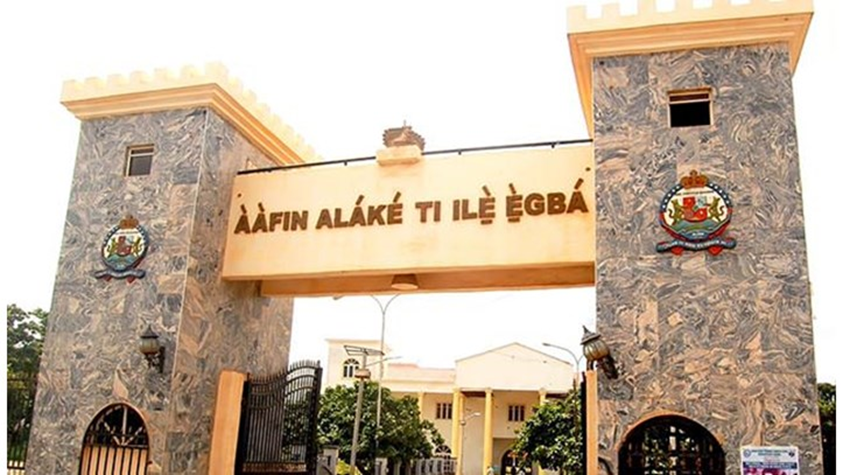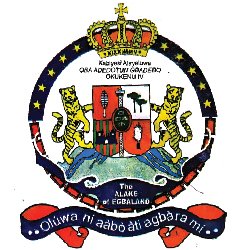History
Egba History & Former Alakes

Alake Somoye (1st time) – Regent 1845-1846
Alake Sagbuwa Okunkenu 1854 – 1862
Alake Somoye (2nd time) – Regent 1862–1866
Alake Ademola I 1869 – 1877
Alake Oyekan 1878 – 1881
Alake Oluwaji 1885 – 1889
Alake Osokalu 1891 – 1898
Alake Gbadebo I 1898 – 1920
Alake Ladapo Ademola II 1920 – 1962
Alake Adesina Samuel Gbadebo II 1963 – 1971
Alake Samuel Oyebade Lipede I 1972 – 2005
Alake Adedotun Aremu Gbadebo Okukenu IV 2005 till present
Egba Anthem
Lori oke o’un petele
Ibe l’agbe bi mi o
Ibe l’agbe to mi d’agba oo
Ile ominira
Chorus: Maa yo, maa yo, maa yo o; l’Ori Olumo; Maa yo, maa yo, maa yo o; l’Ori Olumo
Abeokuta ilu Egba
N ko ni gbagbe e re
N o gbe o l’eke okan mi
Bii ilu odo oya
Emi o f’Abeokuta sogo
N o duro l’ori Olumo
Maayo l’oruko Egba ooo
Emi omoo Lisabi
E e
Chorus: Maa yo, maa yo, maa yo o; l’Ori Olumo; Maa yo, maa yo, maa yo o; l’Ori Olumo
Emi o maayo l’ori Olumo
Emi o s’ogoo yi l’okan mi
Wipe ilu olokiki o
L’awa Egba n gbe
Chorus: Maa yo, maa yo, maa yo o; l’Ori Olumo; Maa yo, maa yo, maa yo o; l’Ori Olumo
The Egba people are one of the Yoruba subgroups in Nigeria, predominantly found in the southwestern region, particularly in Ogun State. Their history is rich and deeply rooted in the larger Yoruba civilization.
Origins and Early History
The Egba people trace their origins to the larger Yoruba ethnic group. They originally lived in a region known as Orile Egba, near Ibadan. However, during the early 19th century, the Egba people faced invasions and conflicts, particularly from the Oyo Empire and other neighboring groups. These pressures forced them to leave their original homeland and migrate southward.
The Founding of Abeokuta
The most significant event in Egba's history was the founding of Abeokuta in 1830. As the Egba people fled their original settlements due to warfare and internal strife, they sought refuge in rocky outcrops and hills. This area provided a natural fortification, which they utilized to protect themselves from invaders. The name "Abeokuta" means "under the rock" in Yoruba, reflecting the geographic features that defined their new home.
Sodeke, a prominent warrior and hunter, guided the Egba to Abeokuta. Under his leadership, the Egba established a confederation of several towns, each with its ruling structure but united under a central authority in Abeokuta. This system of governance helped maintain peace and stability among the various Egba groups.
Abeokuta as a Commercial Hub
Abeokuta quickly grew into a significant center of commerce and culture. Its strategic location along the trade routes between the Yoruba hinterlands and the coast made it a key player in regional trade. The city became known for producing agricultural goods, particularly cotton and palm oil, which were traded with European merchants on the coast.
The Egba also became influential in the spread of Christianity in southwestern Nigeria. European missionaries, particularly from the Church Missionary Society (CMS), were welcomed into Abeokuta, and the first church was established in the mid-19th century. This led to the spread of Western education among the Egba people.
British Colonial Era
During the colonial period, the Egba people had a complex relationship with the British. In 1893, the British recognized Abeokuta as an independent state, and it maintained a degree of autonomy. However, by 1914, Abeokuta was fully incorporated into the British colony of Nigeria as part of the amalgamation of the northern and southern protectorates.
Throughout the colonial period, the Egba people played a significant role in Nigeria's political and economic development. They were active in the struggle for independence, with prominent Egba figures like Herbert Macaulay emerging as key leaders in the nationalist movement.
Post-Independence Era
After Nigeria gained independence in 1960, Abeokuta and the Egba people played an important role in the nation's political and cultural life. The city remains a vibrant center of Yoruba culture, and the Egba people are known for their contributions to Nigeria's development in various fields, including education, politics, law, science, entertainment, and the arts.
Cultural Heritage
The Egba people have a rich cultural heritage, with traditional festivals, music, and art playing significant roles in their society. The Egungun festival, for instance, is a major cultural event that honors the spirits of ancestors. The Egba also has a strong tradition of craftsmanship, particularly in pottery and weaving.
Abeokuta today is not only a historical city but also a symbol of the resilience and ingenuity of the Egba people. It continues to be a center of cultural and political influence in Nigeria.
Egbaland was where Henry Townsend lived and was the home of the first newspaper in Nigeria (Iwe Iroyin). Its people went on to serve as the first of the many Nigerian nations (until recently, the only one of them) to have an anthem.
